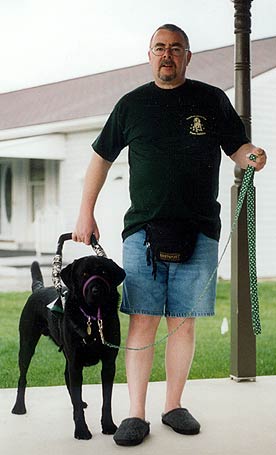'Assistance dog' designation opens doors for pooches.
With state's blessing, S.F. OKs hundreds of therapeutic pets.
Rachel Gordon, Chronicle Staff Writer
Tuesday, October 19, 2004

In this dog-eat-dog world, Frank Jackson finally found solace in a
sweet-faced cocker spaniel named Topper.
Jackson, 55 and
HIV-positive, had trouble with depression and was feeling isolated,
not really wanting to leave home. But two
months
ago, he adopted Topper from a rescue agency. "It's the best thing
I've done in 20 years,'' he said. "He needed love and affection
as much as I did.''
One of the first
things Jackson did was register Topper with the Animal Care & Control agency in San Francisco as an "assistance
dog.''
The official designation gives Jackson the legal right to take his
four-legged companion on the bus or in a taxi and into shops, restaurants
and public buildings. And, perhaps most importantly, his landlord had
to make an exception to the no-dogs policy for the apartment Jackson
rents in the city's Upper Market neighborhood.
Topper is not alone. By last week, San Francisco had issued 658 tags
for assistance dogs -- a number that reflects a big jump since a 2002
ruling by a state regulatory agency that gave people troubled by psychological
and emotional problems the right to keep companion dogs and to exercise
the legal benefits that go along with it.
Service dogs traditionally have been paired with the visually and
hearing impaired, and people using wheelchairs. Now, however, more
are helping people who are depressed or anxious and who rely on canine
companionship to help them cope.
San Francisco began issuing assistance dog tags in 1998. In 1999,
the first full year of the program, 60 tags were given out. The number
issued last year ballooned to nearly 160, and the applications keep
coming.
"The bottom line is that we're seeing a lot of people come down
here with notes from their doctors saying they need a companion dog
to improve their quality of life,'' said Carl Friedman, director of
the city animal control agency. "Now we're seeing a lot of people
applying for the tags who have psychological issues.''
Just about all it takes to get an assistance tag in California is
a note from a doctor and a signed statement from the owner that the
dog has been specially trained. That training, however, can be done
by the owner and can be as simple as teaching the dog to wag a tail
and lick a face if that's what it takes to make someone with a diagnosed
depression feel better.
"Most dogs do that -- lift your day,'' Friedman said. "The
difference between lifting someone's day and helping them get
through the day is a fine line.''
San Francisco trumps other jurisdictions in the Bay Area when it comes
to the number of tags issued. For instance, county and humane society
officials say 199 have been approved in Marin County, 48 in San Mateo
County, 19 in Alameda County, 60 in Contra Costa County and only a
handful by the Silicon Valley Animal Control agency, which includes
Campbell, Monte Sereno and Santa Clara.
When asked why
San Francisco -- a city with a dog population estimated at 100,000,
or about one for every 7.5 humans -- is so
different, Friedman
sat back in his chair and laughed. "Boy,'' he said, "I'd
need about two hours to explain.''
One reason, he suggested, is that San Francisco started the program
before other counties. But on top of that, the city has a large population
of people with disabilities and a keen awareness of individual rights.
California law stipulates that county animal control agencies only
have to process applications for assistance dogs -- not the miniature
horses, monkeys and other critters some disabled people have used to
help them out.
"We had one person come in who wanted a tag for a pot-bellied
pig, but we rejected the request,'' Friedman said. "I didn't want
to get into that. What if a guy comes in asking about his hamster,
and wanted to take his hamster to Macy's? Because this is San
Francisco, we had to draw the line
somewhere.''
San Francisco business owners, building managers and public agencies
are starting to get the hang of what's required of them, said Sgt.
Michael Sullivan, the Americans with Disabilities Act coordinator for
the San Francisco Police Department. He helps mediate disputes between
merchants and customers, trains officers on how to enforce the intricacies
of access laws and tries to educate Muni drivers and others working
with the public.
Patty Hontalas, manager of Louis' restaurant, up the street from the
Cliff House in San Francisco, said she had to be educated when a man
came into the oceanfront dining spot with his small dog last year.
At first she told him that dogs weren't allowed -- the health code
generally bars animals from entering eating establishments -- but the
customer insisted otherwise, arguing his dog was an official companion
animal. With the customer showing no noticeable disability, Hontalas
wasn't sure what to do and called the SPCA for a quick lesson on the
law.
"Now I just ask if they have a tag for their dog,'' said Hontalas,
adding that she doesn't have any problem with well-behaved dogs in
the restaurant. "I am seeing a lot more people bringing their
dogs into businesses.''
The spike in San Francisco started around the same time the California
Department of Fair Employment and Housing issued a ruling in 2002 that
sided with a Placer County couple. The husband and wife, both of whom
suffered from depression, had been told by their condominium association
that they had to abide by the no-dog policy and couldn't keep their
wire-haired terrier mix, Pooky, on the premises.
The state civil rights agency ruled that the condo association discriminated
against the couple based on their doctor-diagnosed disabilities. This
past August, the state Court of Appeal upheld the agency's ruling,
saying that the condo association failed to reasonably accommodate
the couple.
"For the first
time, the California courts have linked fair housing with the companion-animal
question. The decision
signifies that just
as a service animal may assist a person with physical disabilities,
the emotional support derived from a companion animal can help
a person suffering from depression or other emotional illness,''
the Department
of Fair Employment and Housing said in a written statement.
Kristi Kissell has no doubt. She got the special tag from the city
for her dog Rocky after she had a hard time renting an apartment in
San Francisco. She told her new landlady after she signed the lease
that her Corgi-Chihuahua mix would be living with her. By that time,
there was little the owner could do because of the legal protection
afforded Kissell as long as she had the official stamp of approval.
"I'm HIV-positive, and a lot of times it's just me and my dog.
He's always there for me and won't leave my side, helps with my loneliness,''
said Kissell, 41, who lives in the Sunset District. "He really
is great support and had made a big difference in my life.''
Jackson -- Topper's
human companion -- said his life has profoundly improved after securing
the special tag from the city's
animal control
agency, allowing him to keep a dog at home. "The most tangible
thing I can point to is I wake up in the morning with a smile on my
face now,'' he said. "I can't remember the last time I did that.''
E-mail Rachel Gordon at rgordon@sfchronicle.com.

